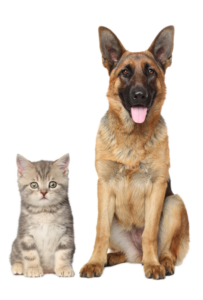The holidays are a festive time for us and our pets. However, due to ongoing activities and constant distractions, we can easily overlook potential dangers to our four-legged family members. Take preventive measures to protect your pets this holiday season. Being aware of these top four dangers could save you a trip to the veterinary emergency room.
1. Holiday Tinsel, Ornaments and Gift Wrap Ribbon
Tinsel, while not toxic, is very attractive to pets, particularly cats. The problem with tinsel is that once it’s consumed, it can cause serious injury to your pet. If not caught in time, this foreign body ingestion could actually be fatal as it twists and bunches inside your pet’s intestines and surgery may be required. In addition, bright, colorful tree ornaments can attract your pet’s curiosity. Place glass, aluminum and paper ornaments higher up on the tree. Pets can chew and swallow these fragile objects and not only can broken pieces form sharp edges that may lacerate your pet’s mouth, throat and intestines, they could also create a choking hazard.
You may be tempted to fashion your pet with a decorative ribbon “collar” but beware that this could become a choking hazard. Also, it’s best to quickly discard ribbons and bows wrapped around holiday gifts so that your curious companions won’t be enticed to chew or swallow them. Ingested ribbon can cause a choking hazard and ultimately twist throughout the intestines, leading to emergency surgery and even death. Always keep ribbons out of reach when wrapping gifts.
2. Holiday Lighting and Candles
Twinkling, shiny and dangling holiday lights — such as the icicle, netting, garland, curtain, rope and candle varietal — may be another source of danger to your curious pets. Got a pet that likes to chew? Electrical shock may occur when a pet chomps down on an electrical cord, causing tongue lacerations and possible death. Check your holiday lights for signs of fraying or chewing and use a grounded three-prong extension cord as a safety precaution. If you have candles on display, place them in a hard-to-reach spot so that your pets can not access them. Not only can pets seriously burn themselves, but knocking over candles creates a fire hazard and may leave a trail of hot wax that will easily burn the pads of paws and more.
3. Food Hazards
Festive events often mean edible treats — and lots of them. Unfortunately, some of the most popular holiday goodies, such as chocolate, bones and nuts, can be extremely toxic or fatal to pets.
Different types of chocolate contain various levels of fat, caffeine and the substances methylxanthines. In general, the darker and richer the chocolate (i.e., baker’s chocolate), the higher the risk of toxicity. Depending on the type and amount of chocolate ingested, dogs might experience vomiting, diarrhea, urination, hyperactivity, heart arrhythmias, tremors and seizures. It’s important to keep chocolate out of reach of dogs. Even wrapped boxes are a danger to dogs. They will seek it out!
Fat trimmings and bones are dangerous for dogs. Fat trimmed from meat, both cooked and uncooked, may cause inflammation of the pancreas (pancreatitis), a potentially life threatening situation. And, although it seems natural to give a dog a bone, a dog can choke on it. Bones can also splinter and cause an obstruction or lacerations of your dog’s digestive system.
Abundant in many cookies and candies, certain nuts should not be given to pets. Almonds, non-moldy walnuts and pistachios can cause an upset stomach or an obstruction of your dog’s throat and/or intestinal tract. Macadamia nuts and moldy walnuts can be toxic, causing seizures or neurological signs. Lethargy, vomiting and loss of muscle control are among the effects of nut ingestion.
Keep your pet on her regular diet and caution visitors against giving your pet special treats or table scraps.
4. Toxic Holiday Plants and Christmas Trees
They may be pretty, but some holiday plants are poisonous—even deadly. As little as a single leaf from any lily variety is lethal to cats. Others to avoid:
Christmas tree pine needles can produce oral irritation, vomiting, diarrhea, lethargy, trembling and posterior weakness. You will also want to avoid putting chemicals in the water for your real Christmas tree. It can be harmful to pets who often drink from this water source. Holly, commonly found during the Christmas season, can cause intense vomiting, diarrhea and depression. Mistletoe, another Christmas plant, can cause significant vomiting and diarrhea, difficulty breathing, collapse, erratic behavior, hallucinations and death when ingested. Poinsettias can cause irritation to the mouth and stomach and sometimes vomiting.
Taking precautions with pets during these festive times can help ensure that you and your family will enjoy a happy and healthy holiday season!




